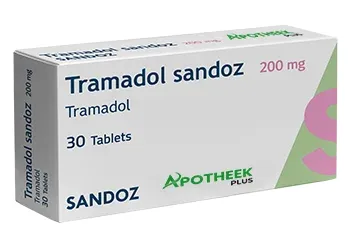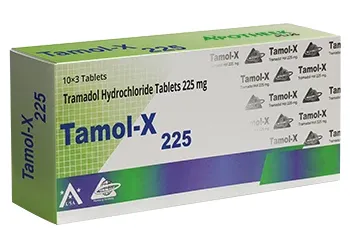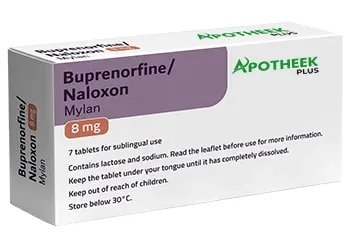What are you looking for?
Search
Welcome to Apotheek Plus France!

Codeine: Uses, Warnings, Dosage, Side Effects & Safety Guide

Codeine 10 mg is an opioid medicine commonly prescribed for mild to moderate pain and sometimes for cough suppression. While effective, it also carries important risks and side effects that patients and pharmacists should be aware of before use. This guide covers everything you need to know about codeine, including uses, dosage, interactions, and addiction risks.
How Codeine Works in the Body
Codeine is an opioid pain medication that affects the central nervous system to lessen the perception of pain.
When codeine is ingested, it is metabolised in the liver to morphine by the CYP2D6 enzyme and endows it with pain-relieving properties.
Codeine is also a cough suppressant, and knowing that makes it an effective suppressor of persistent coughs - though today its use for cough in many countries has been greatly reduced because of safety concerns.
Uses of Codeine
-
Pain relief: For mild to moderate pain such as headaches, dental pain, muscle pain, or post-surgical discomfort.
-
Cough suppression: Reduces dry, persistent coughs (available in syrup form, typically containing guaifenesin).
-
Diarrhea control: Rarely prescribed for severe diarrhea due to its constipating effect.
Codeine Regulation in France
In France, all medications containing codeine are classified as prescription-only. Since July 2017, over-the-counter sales of codeine-based medicines have been prohibited to limit the risk of misuse and addiction.
Starting December 1, 2024, the French National Agency for Medicines and Health Products Safety (ANSM) introduced a new rule: prescriptions for codeine and tramadol must be written on a secure prescription form (ordonnance sécurisée), with a maximum duration of three months.
These regulations ensure that codeine is prescribed safely and monitored effectively to prevent dependence or overdose.
Warnings
-
Risk of addiction: Codeine is habit-forming and may cause substance use disorder and misuse.
-
Respiratory depression: May make breathing too slow, especially in children or adults with severe breathing problems.
-
Children under 12 years: The use of codeine is not recommended in children below the age of 12 years.
-
Ultra-rapid metabolizers: In some, codeine is metabolized to morphine too quickly, raising the likelihood of overdose.
-
Alcohol & sedatives: Mixing with alcohol, benzos, or sleep medications significantly increases the risk of overdose.
-
Pregnancy & breastfeeding: It can cause harm to gestation and can flow through breast milk into the baby's body, causing toxicity to the infant.
Before Taking Codeine
Inform your doctor or pharmacist if you:
-
Tell your doctor or pharmacist if you:
-
Suffer from asthma, COPD, or other breathing issues.
-
Have a liver or kidney problem.
-
Battle substance abuse or have a history of opioid addiction.
-
Are you pregnant, nursing, or considering surgery?
-
Do you take any other medicines that make you sleepy or slow your breathing?
Codeine Side Effects
Common codeine side effects:
-
Drowsiness, dizziness
-
Constipation
-
Nausea, vomiting
-
Dry mouth
-
Lightheadedness
Get emergency help if you experience any of the following side effects:
-
Slow or difficult breathing
-
Confusion or extreme drowsiness
-
Chest pain or irregular heartbeat
-
Allergic reaction Allergic reactions (skin rash, swelling, shortness of breath)
Tip for patients: Drink lots of water, get fiber in the diet, and stay active to prevent constipation from codeine.
Codeine Use in Specific Populations
-
Children: Codeine is not recommended for children under 12 and should be avoided in adolescents after tonsillectomy or adenoidectomy.
-
Pregnancy: Codeine should only be used during pregnancy if necessary and under medical supervision.
-
Elderly: The elderly are more sensitive to the sedative and respiratory effects of opioids; dosage should be adjusted accordingly.
Drug Interactions & Contraindications
Drug Interactions
Codeine and other medicines. Codeine interacts with several other medicines.
Other CNS depressants (eg, other opioid [concomitant and DOC non-recommended], sedative hypnotics, benzodiazepines, alcohol) – potential for respiratory depression.
Antidepressants (fluoxetine, paroxetine) can inhibit CYP2D6 and decrease analgesia.
MAO inhibitors can have life-threatening side effects in combination.
Contraindications:
Respiratory depression or asthma attacks
Severe liver disease
Known hypersensitivity to codeine or any other opioid
Dependence, Misuse & Withdrawal
Risk of Dependence
Codeine, like all opioids, carries a risk of dependence when used for long periods. Misuse of codeine-containing medications can lead to addiction, tolerance, and withdrawal symptoms upon discontinuation.
Withdrawal Symptoms may include restlessness, anxiety, sweating, muscle pain, and insomnia.
Patients should always follow prescribed doses and consult a doctor before stopping the medication abruptly.
Alternatives to Codeine
Safer Alternatives for Pain Relief
Depending on the type and intensity of pain, doctors may recommend non-opioid medications such as:
Paracetamol (acetaminophen)
Ibuprofen or other NSAIDs
Tramadol (in prescribed cases)
Non-drug therapies — such as physiotherapy, mindfulness, and relaxation techniques — can also complement pain management.
Codeine Dosage
-
Adults (pain relief): 15–60 mg every 4–6 hours as needed (not exceeding 360 mg per day).
-
Codeine 10 mg tablets: Usually given for mild pain or combined with acetaminophen for a stronger effect.
-
Cough syrup with codeine: 5–10 mL every 4–6 hours (measure with a medical syringe, not a household spoon).
-
Elderly patients: May need lower doses due to higher sensitivity.
-
Children: Not recommended under 12 years old.
Never exceed your prescribed dose. An overdose can be fatal.
Interactions
Codeine interacts with many substances, including:
-
Alcohol greatly increases sedation and overdose risk.
-
Benzodiazepines (e.g., diazepam, lorazepam) – additive risk of slowed breathing.
-
Antidepressants (SSRIs, MAOIs, tricyclics) – may intensify side effects or serotonin syndrome risk.
-
Other opioids – increase overdose danger.
-
Antihistamines & sleeping pills – worsen drowsiness and confusion.
Always inform your doctor or pharmacist about all medications and supplements you’re taking.
Frequently Asked Questions (FAQ)
Is codeine addictive?
Yes. Codeine can be habit-forming even when it’s taken as recommended.
How long does it take for 10 mg of codeine to work?
Generally takes 30–60 minutes, lasting 4–6 hours, which may be repeated as necessary.
Is it safe to drink on codeine?
Combining alcohol with codeine is known to increase the risk of dangerous breathing problems and overdose.
What if I miss a dose?
If it is taken regularly, take it as soon as you remember. Skip it if it’s almost time for your next dose, and then go back to taking your Uriven as usual. Never double dose.
How do you wean off codeine?
Do not stop suddenly. Wean slowly with your doctor to prevent withdrawal.
Is it safe to drive while taking 10 mg of codeine?
Don’t drive or operate machinery until you know how it affects you—it can make you sleepy and slow your reaction time.
Is codeine safe in pregnancy?
Not normally recommended; it may hurt the baby. Always consult your doctor.
Where to buy codeine 10 mg?
Most polities require a prescription to purchase codeine. So do patients in Europe who inquire about buying it from an online pharmacy in France. It could be available at some licensed pharmacies with a legitimate prescription.
Conclusion
Codeine 10 mg can be an effective option for pain and cough relief, but it must be used carefully due to the risk of addiction, interactions, and side effects. Patients should follow the prescribed codeine dosage strictly, while pharmacists play a crucial role in counseling on safe use.
Always consult your healthcare provider before starting or stopping codeine.








